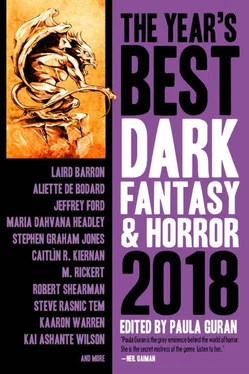“Excellent, ladies, here’s your tea,” I murmur as Kumiko brings out a fragrant batch in the teapot painted with Dutch children skating on a pond. I want to gorge on a stack of pressed cheese sandwiches until my body threatens to resign.
After the imperial pair finishes and offers parting complaints and leaves nary a tip for Alex or Kumiko, I notice a mother and daughter tucked in the corner. The girl is black-haired like my Alicia, five or six; I wander closer to see that yes, her eyes are Alicia’s green. She smiles, a tooth missing.
Alex interrupts my reverie with a rare apology; sorry he got that order topsy-turvy. His apron is off; he never stays a second past his shift. His lashes brush the lenses of his hip glasses.
I assure him it’s not the end of the world, not by a long shot.
He’s not accustomed to admitting a failing, to feeling bad. He’s not used to making a slight mistake that someone pounds into the dirt with a sledgehammer.
Kumiko and Jason commandeer the room as I approach the corner table. The mother lights up and whispers at me companionably, conspiratorially, “Gosh, those ladies were something else. How do you stand it?”
“There are worse things,” I say. The child is daintily eating the mozzarella—M!—flatbread, and her teacup, the artful scarlet-rose one, holds the Sweet Dreams & Citrus that shivers when she brings it to her lips.
What else may I do for them; are they having a good time; what else may I bring?
The mother is around my age, nearing forty, though she is much more in the forty-is-the-new-twenty category, olive-skinned, mahogany hair with yellow highlights. Her bracelets jangle out music. The girl has a rhinestone barrette shaped like a spider, and she tells me proudly that her name is Charlotte.
“Did you spin any webs for Wilbur?” I ask; my blood flows as if gates have lifted in my veins. The child beams at me. “Yes!”
We chat about the places where Charlotte’s Web made us cry, and the mother adds that she even gets teary-eyed in public when she recalls certain parts.
I almost say my little girl loves books, too. I wrote and taught poetry, once.
“I’m Betty,” says the mother, “but my friends call me Bird.”
The creature my child saved, brought back to life. Yellow feathers now yellow streaks in hair. Betty praises the butter’s sweetness and the apricot tarts, today’s special. It’s lovely to be here. Her clothing is pressed, high couture. Piercing her ears are diamonds. “Look at us, enjoying high tea,” she says to Charlotte. Because it’s around twelve o’clock.
I explain that high tea is so-called because the tables are high. People at a social gathering wander and graze on food and drink set up for easy access. “High” doesn’t signal the hour. Americans think of high noon. Gunslingers! Time to settle scores.
“That’s amazing!” Betty proclaims. Her daughter nods. They’ve learned something, together. They probably dance at night, Mother making Baby giggle by offering to toss her into the stars. I’m dying to ask what Betty “does,” other than care for this smart, pretty, alert child. My skills in chatting with customers need sharpening.
Charlotte swings her legs and gazes with a devotion at her mother so profound that I glance away, because it’s not meant for me. Well-trained, a city girl, she thanks me for the tea, the cup, the mozzarella and desserts. Kumiko clears tables; Jason shines the coffee urn. My staff knows nothing about Alicia, nothing of my history. Charlotte near-shouts, “Could we have my birthday here, Momma? May I, please?” Her fingernails shine with dots of crimson polish still wet-looking.
Betty wholeheartedly agrees… Certainly! Charlotte’s sixth birthday will be here next week, at the Wonderland Tea Shop! We live only two blocks away! Sorry she must hasten now, she tells me, but she has a deadline. Her aspect clarifies as familiar, from the papers and from my long-ago, long-slumbering days as a poet. It’s Betty Lezardo, the novelist whose successes have been capped recently with a National Book Award.
A soaring career and the most darling child alive; a woman my age accomplished and kind.
When I inquire if she’s Betty Lezardo, she shyly nods and asks for my name.
Dorrie. Doreen Dias.
A hand extended to press against mine. Betty/Bird says, “I have a question about your murals.” She points—artist’s eye—toward the Hatter and March Hare, the crazy duo at their table, in leg irons. That, she avers, is odd enough. “But where is the Dormouse?”
Almost no one catches that omission. That absence.
“The Hatter and Hare pinched the Dormouse several times, in the original story,” I say. “Remember? It didn’t do them any harm. They used it as a cushion. They poured hot tea on its nose, to torment it. I don’t want to stick it anywhere near those two.”
Betty finishes her tea. Basic green, superior for weight-watching and longevity.
For fear of upsetting the child, I omit mentioning the other detail about the Dormouse that gets glossed over: When Alice left the table, the two madmen were stuffing the poor tiny thing headfirst into the teapot . Another reason I had the muralist clap the madmen in leg irons. Were they trying to kill it? Or just escalate the torture? The Dormouse appears at Alice’s trial in the famous book… so it survived, unless its appearance is obeying the rubric of fantasy and it’s come back from the dead. But the madmen, at the very least, must have watched it struggle for air.
Betty and Charlotte’s tea and edibles are on the house, in thanks for wanting the birthday under my roof. My face is an unreadable mask over agony when Charlotte throws her arms around my middle to say goodbye and rests her head where I can hold it, that soft dark hair.
No reason to add that the two Princeton dropouts who drowned my child for kicks stuffed her headfirst into a drainpipe near the Hudson. She was not raped. The defense attorney cited this as cause for leniency. I hold my breath sometimes, to own the exact feeling she suffered. But I can’t begin to fathom it. I’m not at the mercy of someone else.
The customers disappear, a breather before the late afternoon tide, and then nothing; we close at six; then prep for tomorrow and me under an afghan as I watch an umpteenth rerun of Mad Men , starving myself, alert to street noises. I should take my pistol upstairs, but I hate having it near Alicia’s Mr. Bun, Mabel, and Jackie. Does Charlotte have a spider doll, a pig? Is Betty’s book award in a frame? The water runs hard in the kitchen; Kumiko is scrubbing the grill pan. Baking soda and boiling water clean the pots; no detergent to interfere with the delicate balance of tea. Jason is belting out lines from Cats because he’s in the chorus; Kumiko groans and orders him to stop. She meets my eyes with sadness that she’ll soon be gone. I let myself feel touched she’ll miss me.
Some drunken fool is yelling as time-wasters spill out of a bar. Two in the morning. Scratchy blanket, gut like a drum. I awaken from my recurring dream of carrying a sleeping Alicia, her head on my shoulder. Since her death, she is sunk everywhere, and therefore everything is Alicia: flour, lightning rod in the distance, Mrs. Marcy’s lapdog drowsing as she drinks chrysanthemum tea. Alicia is the blue of the caterpillar on my wall.
A prayer for her phantom to visit; a prayer I won’t keel over of fright. A rattling of my shop’s door! I should sleep with the gun near, though I barely know how to fire it.
The sound goes away. Probably they’d only invade my refrigerator. Zucchini frittatas tomorrow; hibiscus herbal tea on special.
In the week of planning Charlotte Lezardo’s party, I get to know her and her mother better; they stop by for tea daily. Charlotte favors a brooch with a fake-emerald lizard. Momma allows her a hint of rouge, “just for fun.” Betty wrings her hands about writer’s block, and I say, Oh, that must be awful. Terrible.
Читать дальше












